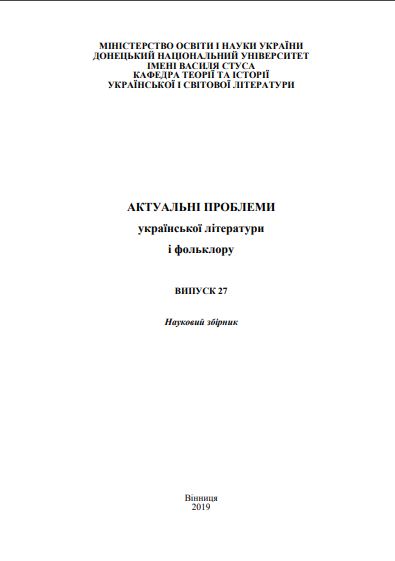The historical past in Volodymyr Sosyura’s vision.
DOI:
https://doi.org/10.31558/2308-1902.2019.27.6Keywords:
epic works, historical subjects, national liberation struggleAbstract
The complex analysis of V. Sosyura’s historical epic is given, based on the material of poems «Makhno» and «Mazepa» poems and the novel in the poems «Taras Tryasylo» as well. The reasons for V. Sosyura’s interest in the epic subject are clarified. There is evidence that the historical epic was a new concept in the V. Sosyura poetry. Attention is focused on the fact that in his youth, V. Sosyura was attracted to anarchist ideas, he was interested in the figure of Makhno as the leader of the peasant masses. In his lines directed to Makhno the author expresses condolences to his hero.
V. Sosyura was interested in the traditional for foreign and Ukrainian writers is the image of Hetman Mazepa. Poem «Mazepa» is an epic work with a pronounced lyrical tone, which is a unique combination of historical events with romance of Mazepa’s love story. It is emphasized that first of all the author creates an artistic image of his hero and tries to reveal the psychology of a fighter for Ukraine. The tragedy of the poem hero and the tragedy of Ukraine are bound together. It is noted that V. Sosyura goes further than other authors in depicting forbidden topics, showing the role of Mazepa in the national historical process.
A prominent place is given to the historical novel Taras Tryasylo among the other epic works. The reasons for V. Sosyura’s appeal to the Cossack leader’s figure are considered. The character’s formation and development are exposed. In the beginning of the work the author shows the social position of his hero and sympathizes him. Together with sympathy, V. Sosyura fills his life with charismatic and even fantastic features taken from folklore. The combination of two story lines is traced: the depiction of the liberation struggle in Ukraine and the tragedy of a woman who converted into the Tatar faith after being captured.
It is concluded that the historical epic of V. Sosyura is an invaluable document from the witness of rough events.
References
Сосюра В. Розстріляне безсмертя. Поема. Вітчизна. 1988. №1. С. 93–107.
Барабаш Ю. Іван Мазепа – ще одна літературна версія. Київ. 1988. № 12. С. 140– 150.
Гальченко С. Проблеми видання спадщини В. Сосюри. Актуальні проблеми української літератури і фольклору. Випуск 1. Донецьк: Кассіопея, 1998. С. 10–19.
Моренець В. Володимир Сосюра. Нарис життя і творчості. Київ: Дніпро, 1990. 261 с.
Ткачук М. Іван Мазепа. «З думою про Україну» Відродження. 1991, 5 лютого.
Сосюра В. Мазепа: Поема. Вибрані твори: у 2 т. Т. 2: Поеми. Роман. Київ: Наукова думка, 2000. С. 86–179.
Гришко В. Серце «другого Володьки» і заборонена любов. Карби часу. Історія, література, політика, публіцистика: у 2-х т. Київ: Смолоскип, 1999. Т. 1. 868 с.
Зеров М. Володимир Сосюра – лірик і епік. (З приводу роману «Тарас Трясило»). Твори. Київ: Дніпро, 1990. Т. 2 С. 505–516.
Белецкий А. Владимир Сосюра. Красное слово. 1928. №5. С. 148–150.
Сосюра В. Тарас Трясило. Роман. Харків, 1925. 80 с.
Багрій М. Роман у віршах Володимира Сосюри «Тарас Трясило» як зразок становлення канонів соціалістичного реалізму в українській літературі. Вісник ЛНУ імені Тараса Шевченка. №4 (263), Ч. ІІ. Луганськ: Видавництво Державного закладу «ЛНУ імені Тараса Шевченка», 2013. С. 106–113.

